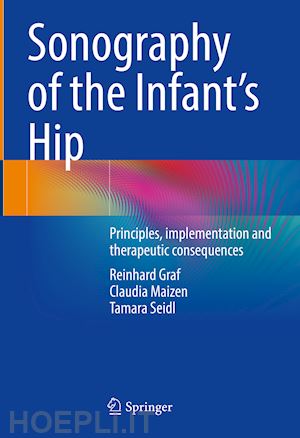
Questo prodotto usufruisce delle SPEDIZIONI GRATIS
selezionando l'opzione Corriere Veloce in fase di ordine.
Pagabile anche con Carta della cultura giovani e del merito, 18App Bonus Cultura e Carta del Docente
This textbook, offers a quick and easy introduction to the fundamentals of hip sonography as standardised screening tool for detecting developmental dysplasia and dislocation of the hip (DDH), thus allowing for early treatment in the neonatal period.
An evidence based treatment algorithm, as well as tips and tricks for both the novice and the expert user, offer additional insight into common mistakes and technical difficulties.
Prof Graf, the founder of hip sonography, has, together with other leading experts in this field, compiled everything you need to know about hip sonography, into this comprehensive, well illustrated textbook.
Main features are:
This textbook will be an invaluable reading for paediatric orthopaedic surgeons, paediatricians, physiotherapists, radiologists and sonographers and anyone involved in DDH care.
1 Congenital hip dislocation and hip dysplasia.- 2 Sonographic technique, equipment, and image projection.- 3 Basics of hip sonography.- 4 A tactical, step by step approach to hip sonography.- 5 Positioning, scanning technique and possible errors.- 6 Measurement technique and possible errors.- 7 Classification of sonographic findings.- 8 Reporting.- 9 Dynamic stress test.- 10 Pitfalls and potential sources of error.- 11 Sonography-guided therapy.- 12 Syllabus and course content: Tips for the faculty.- 13 Practise section.- 14 Literature.
Prof. Reinhard Graf is an esteemed Austrian orthopedic surgeon and medical professor known for his significant contributions to the field of orthopedic surgery. Born in Graz, Austria, he obtained his medical degree from the University of Graz in 1971. After completing his education, he began his career as a general practitioner in 1974 and later specialized in orthopedic surgery in 1980.
In 1983, Prof. Graf was awarded the prestigious Austrian, Swiss, German (ASG) International Fellowship, which further enhanced his knowledge and expertise in the field. He served as the Medical Director of the General and Orthopedic Hospital Stolzalpe from 1988 to 2011, after which he retired as an emeritus.
Additionally, in 1990, he was appointed as a Professor for Orthopedic Surgery at the University of Graz, Austria. Prof. Graf's leadership and influence extended beyond his clinical and academic roles. He served as the President of the Austrian Society of Orthopedic Surgery in1992 and 1993, overseeing the advancement of orthopedic surgery in the country. Moreover, he held the position of President of the International Society for Sonography on the Locomotor System (ISMUS) from 1991 to 1993, contributing to the field's development on a global scale. In 2004, he presided over the South German Orthopedic Congress in Baden-Baden, Germany.
Throughout his career, Prof. Graf has received numerous national and international accolades and awards, recognizing his exceptional contributions to orthopedic surgery and research. Prof. Graf's contributions have not only been recognized within the medical community but also by various governments and organizations. He has received several decorations, including the Great Honorary Medal for "Specific Merits for the Austrian Republic" in 2008 and the Great Honorary Medal of the Austrian Republic. The city of Stolzalpe bestowed upon him the honorary citizenship and honorary ring for his exceptional service.
Last but not least, Prof. Graf authored more than 250 papers in different international journals, as well as 4 books (15 as co-author) and held more than 500 training courses in Hip sonography worldwide.
Dr. Claudia Maizen is a Consultant Paediatric Orthopaedic Surgeon at Barts Health Trust in London, UK. She has a special interest in treatment of DDH and hip Ultrasound screening, and is a founding member of the International Interdisciplinary Consensus Committee for DDH Evaluation (ICODE), chair of the education committee, as well as member of the BSCOS DDH steering group. Dr. Maizen was born in Austria and attended medical school at the Karl Franzens University Graz. She completed her orthopaedic training in Austria and moved to the UK for further training in paediatric orthopaedics, before being appointed as consultant at the Royal London Hospital in 2010, where she is clinical lead for the paediatric neuromuscular service. In her academic career she has published numerous papers in peer-reviewed journals, is PI for numerous multicenter studies and reviewer and subspecialty editor for peer- reviewed journals. She has a passion for medical education and is also faculty on international courses and course organiser of the Graf hip Ultrasound courses in London. Dr. Maizen is also involved in humanitarian projects and contributes to providing orthopaedic care to children in Africa and Mongolia, where she is also involved in teaching local surgeons.
Dr. Tamara Seidl is head of the department for paediatric orthopaedic surgery at Klinikum Herford in Germany. Since 2003 she has a special interest in hip ultrasound according to Graf and treatment of DDH. She is coordinator of the German AWMF-guideline DDH. Furthermore she is course instructor of hip ultrasound in infancy level III of the German society for Ultrasound in Medicine. Since more than 10 years she organizes hip ultrasound courses according to Graf in Germany. In her academic career she has published numerous papers about hip ultrasound in peer-reviewed journals.
Dr. Seidl was born in Munich and attended medical school at the Ludwig Maximilian University Munich. She completed her orthopaedic training in Bielefeld and moved to Berlin for further training in paediatric orthopaedics at the Charité Berlin.











Il sito utilizza cookie ed altri strumenti di tracciamento che raccolgono informazioni dal dispositivo dell’utente. Oltre ai cookie tecnici ed analitici aggregati, strettamente necessari per il funzionamento di questo sito web, previo consenso dell’utente possono essere installati cookie di profilazione e marketing e cookie dei social media. Cliccando su “Accetto tutti i cookie” saranno attivate tutte le categorie di cookie. Per accettare solo deterninate categorie di cookie, cliccare invece su “Impostazioni cookie”. Chiudendo il banner o continuando a navigare saranno installati solo cookie tecnici. Per maggiori dettagli, consultare la Cookie Policy.